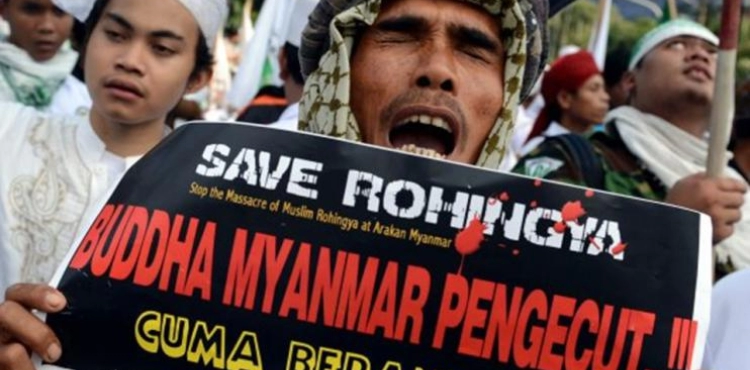After years of conflicts and displacement, the Rohingya in Burma fear a return to power of the military regime for fear of new violence in Rakhine State, where population groups have declared their support for the new authorities.
A large segment of this Muslim minority, whose members do not possess a nationality, have spent years in crowded displacement camps without the freedom of movement or the provision of health care in conditions described by human rights defenders as amounting to "apartheid."
The military repression that was recorded in 2017, which saw the destruction of entire villages and the escape of about 750,000 of them to Bangladesh to escape the atrocities, rape and extrajudicial killings, are still ahead of them.
In a camp near Sittwe, the capital of Rakhine state, a 27-year-old Rohingya man who asked not to be named said, "With a democratic government, we will have some hope of returning home," adding, "But now, we are definitely unable to return."
The Burmese authority had faced prosecutions in the International Court of Justice on charges of genocide during the violence that was committed in 2017 in Rakhine, where the majority of the Rohingya lived in Burma before their displacement.
Army Chief Min Aung Hling, who has been leading the military council since the coup, has repeatedly said that repression was necessary to end the state of rebellion in Rakhine.
"There is a real risk that (this system) will lead to more violence in Rakhine," said Tun Khin, head of the non-governmental organization Burmese Rohingya in Britain.
After assuming power, the military council pledged to respect plans to return refugees from Bangladesh, which had been neglected for years.
However, "Nobody believes what they say," according to Tun Khin.
Aung San Suu Kyi, the de facto head of government during the crackdown in 2017, defended the Burmese army during hearings held by the International Court of Justice in 2019 against the background of the accusation of genocide.
Despite this, Rohingya refugees in Bangladesh have sent messages of support to the demonstrators who challenge the junta daily, calling for Aung San Suu Kyi´s return.
Some of them posted pictures on social media, in which they performed the three-toed salute, which has become a symbol of resistance to military rule.
Rakhine State, which has a minority of Rohingya and a majority of Buddhists, has been mired in decades of conflict.
In recent years, the army has encountered the "Arakan Army" rebels, who are fighting for greater autonomy for the Buddhist population of the "Rakhine Ethnicity".
However, a few days after the coup, the Military Council restored the Internet 19 months after it was cut off and reiterated its commitment to a ceasefire with the rebel group.
He also announced that a member of the Rakhine National Party would join the government.
In the context of a mass amnesty, the regime released Aimong, the former leader of the Nationalist Party, who was imprisoned by Aung San Suu Kyi´s government in 2019, after a speech that was followed by bloody riots.
Some locals believe that an alliance with the military will give them the opportunity to gain greater autonomy in Rakhine.
"This time, it will be different with the military administration," said Miu Kyaw Aung, a resident of Minbia, considering that the strength of the National Arakan Party and the Arakan Army gave more weight to "Rakhine" in the negotiations.
Tun Maung, who lives in the heart of what was a centuries-old kingdom ruled by the Rakhine kings, still remembers hiding in a well to escape gunfire under the last military rule.
"I lived under a military dictatorship and under a civilian government (...) I know the difference," says the sixty-year-old man who wanted to speak but with a pseudonym.
"We cannot accept to live under military rule again," he said.
He remembers how soldiers forced residents of his village to work for free, paving roads or building military barracks.
Rakhine families who refused were subjected to intimidation and fines.
"I despise them deeply," he told France Press, adding, "I prefer to choose someone who kills me twice instead of another who kills me five times."












